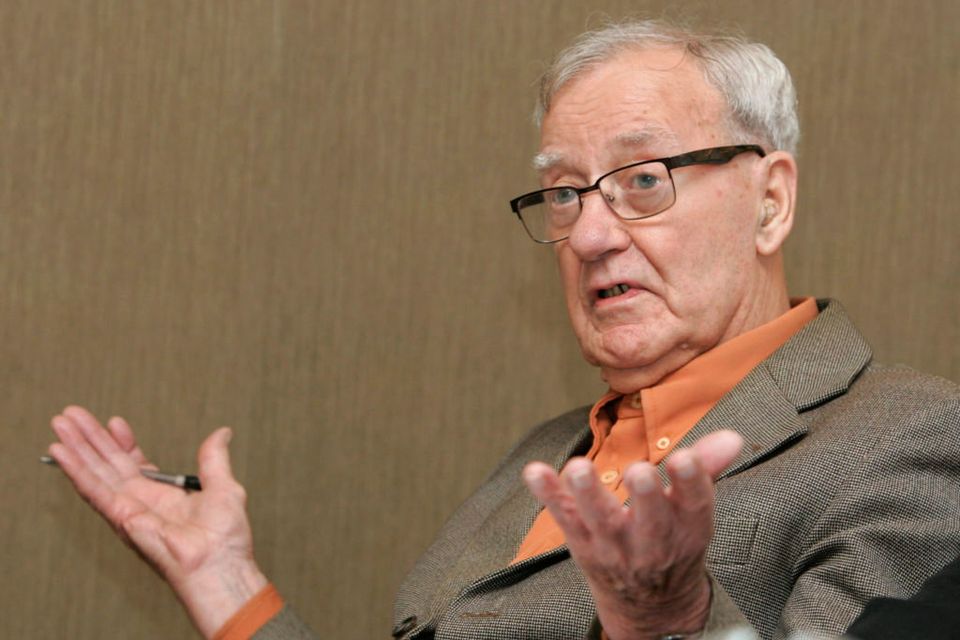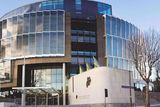Obituary: Sam Nolan, carpenter by trade and socialist by conviction, who helped to win the 40-hour week in the 1960s
Sam Nolan left the Communist Party of Ireland in 1976. Photo: Mark Stedman
Veteran politician and trade union activist Sam Nolan, who has died at the age of 93, was a prominent and active figure on the Irish left from the 1940s onward, and served for many years as secretary of the Dublin Council of Trade Unions.
Born in Dublin in 1930, in the late 1940s he joined the Irish Workers’ League (as the Communist Party was known at the time in southern Ireland) and in 1952 became a member of its executive committee.
He was a leading member of the Unemployed Protest Committee, set up in 1957. In the 1960s he became active on the Dublin Housing Action Committee, which carried out a high-profile campaign on an issue that remains highly relevant.
In the 1969 general election, he stood in Dublin Central as a candidate for the Irish Workers’ Party (IWP), as the Irish Workers’ League was now called. He got only 242 first preferences, and Labour’s Frank Cluskey was elected from his constituency.
In 1970, the IWP merged with the Communist Party of Northern Ireland (CPNI) to form the Communist Party of Ireland (CPI), and Nolan was elected as deputy general secretary.
The CPI initially denounced the August 1968 invasion of Czechoslovakia by the USSR, which resulted in the overthrow of Alexander Dubcek’s liberal regime. However, the CPI changed its line some years later — and in January 1976, Nolan resigned from the party in protest, along with 21 other members who then established the Irish Marxist Society.
He later joined the Labour Party where he helped to form an internal group called Labour Left and was also elected to the party’s administrative council. On the professional side, he became a full-time organiser for the Union of Construction, Allied Trades and Technicians (UCATT) which later merged into Unite.
In the 2010 biography titled Sam Nolan: A Long March on the Left, author Brian Kenny of the Irish Labour History Society wrote that Nolan’s father (also Sam) was a carpenter from Naas, Co Kildare, who joined the British Army at the start of the First World War and survived the horrors of the conflict in France.
He moved to Dublin in 1924 where he met and married Annie Kavanagh, a domestic servant from Rathangan, Co Kildare, who shared his left-wing outlook. Their only child Samuel James was born in the Rotunda Hospital on September 23, 1930, and they set up home on Maxwell Street in the south inner city.
Sam Sr was a member of the Irish National Union of Woodworkers and hung a large picture of Stalin in the hallway of the family home, as well as being involved with his wife in 1933 in the second attempt at setting up the Communist Party of Ireland.
Young Sam attended the Damer School in the basement of the Unitarian Church on St Stephen’s Green. He later moved to the Christian Brothers School on Donore Avenue, before transferring to CBS Synge Street.
He left after the Inter Cert to work as a messenger in Guinness’s brewery. He left that job at age 16 to begin a five-year apprenticeship as a carpenter — resulting in a career in the trade that lasted 50 years.
In 1947, young Sam and an apprentice plumber, Billy Gannon, joined the Socialist (later Democratic) Youth Movement, whose other members included such figures as Roy Johnston, Justin Keating and Brendan Behan’s brothers, Dominic and Brian.
Sam met Audrey Herrity, his future wife, at one of the organisation’s social events. When the movement started to fade in 1949, Nolan and some of the other members joined the Irish Workers’ League. This marked the beginning of several decades on the Marxist wing of Irish politics, where he played a very active role in an effort to build a socialist society.
His partner later in life, Helena Sheehan, professor emeritus who taught in Dublin City University (DCU), recalled in a speech at his funeral service in Glasnevin Crematorium that she initially saw him from afar, when he was speaking from various platforms.
“Through the 1970s, I was often in the crowd listening to this authentic and inspiring voice of the working class, denouncing Irish governments and global capitalism, I also couldn’t help noticing that he was quite handsome,” she said.
She got to know him better when she joined the Communist Party and later as part of the left faction within the Labour Party. They embarked on a relationship that was both highly political and intensely romantic.
“We lived together for four decades,” she said. “Once, in Greece, a comrade said that we were the ideal couple for the left — a carpenter and a philosopher, a trade union official and a university professor.”
The Philadelphia-born Sheehan continued: “As Marxists, we believed that so many issues boiled down to capitalism as the problem and socialism as the solution. We pursued this by every means in our power.”
Nolan retired from his job as a full-time trade union official at 65 — but he continued to serve as secretary of the Dublin Council of Trade Unions, as well as being chair of the Finglas- Cabra Partnership and a member of the Employment Appeals Tribunal, among other roles.
“We still put on our marching boots against every new US war and against every Irish government ruling against the interests of the working class,” Prof Sheehan recalled.
As time advanced, Nolan became increasingly frail and he spent his final years at his daughter’s home in Naas, Co Kildare. One of his last outings was to attend the launch of his partner’s book Until We Fall: Long Distance Life on the Left, published last year.
“In the days since he died I have felt overwhelmed with grief and regret, but I want to concentrate on the excellent life he lived and what a mark he left on so many of us,” Prof Sheehan said.
“So, Sam Nolan, thank you for the days. Now you’re gone, but we live on and the struggle continues. A luta continua [the struggle continues].”
Another speaker at the funeral was trade unionist Mick O’Reilly who in his 2019 book From Lucifer to Lazarus: A Life on the Left wrote about how he was a member of the Irish Workers’ Party who also opposed the Soviet-led invasion of Czechoslovakia in 1968. He was one of the members who left the party seven years later with Nolan — and he recalled at the funeral how “that wasn’t difficult for me, but it was very difficult for Sam”.
The ceremony at Glasnevin was attended by President Michael D Higgins who said in a statement issued previously: “Sam Nolan was to the forefront of the most important struggles of his lifetime, be it highlighting the consequences of the unemployment of the 1950s, to winning the 40-hour week in the 1960s, and for trade-union recognition, the anti- apartheid campaign, and for human and democratic rights for women and men all across the world.
“In the 1950s and in later decades, this was not an easy road — and Sam Nolan fought for these vital rights while being at times confronted with great hostility.”
Samuel James Nolan passed away peacefully on April 14 at Tallaght University Hospital. Deeply regretted by his loving partner Helena (Sheehan), children Brent, Mark, Conor, Paula, Aileen and other relatives. He was predeceased by his wife Audrey (née Herrity), who died in November 2016.
Join the Irish Independent WhatsApp channel
Stay up to date with all the latest news













